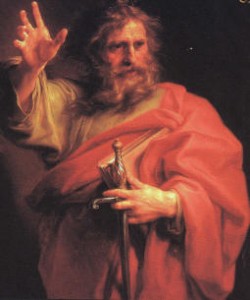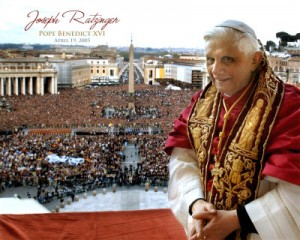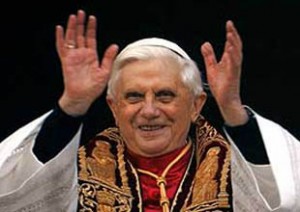
Sola Fide
On Wednesday, November 19, 2008, during Pope Benedict’s general audience in St. Peter’s Square, the Pope made the most remarkable statement:
That is why Luther’s expression, sola fide, is true if faith is not opposed to charity, to love. Faith is to look at Christ, to entrust oneself to Christ, to be united to Christ, to be conformed to Christ, to his life. And the form, the life of Christ, is love; hence, to believe is to be conformed to Christ and to enter into his love. That is why, in the Letter to the Galatians, St. Paul develops above all his doctrine on justification; he speaks of faith that operates through charity (cf. Galatians 5:14).
Read whole document.
In the Roman Catholic Church, this is the Year of the Apostle Paul. Pope Benedict XVI during this weekly audience is teaching the faithful about Paul’s life, mission, and theology. This particular Wednesday audience focused on the Apostle Paul’s understanding of justification. Simply, justification is the biblical teaching on how we are made right with God.
Therefore, since we have been justified by faith, we have peace with God through our Lord Jesus Christ. Through him, we have also obtained access by faith into this grace in which we stand, and we rejoice in hope of the glory of God. (Rom 5:1-2 ESV).
In a most extraordinary declaration, Pope Benedict XVI not only expounded the Apostle Paul’s understanding of justification, but also, he agreed with Martin Luther’s interpretation of that doctrine.
Martin Luther’s views have long been a point of conflict between Protestants and Roman Catholics. Luther’s focus on sola fide, faith alone (as opposed to faith and works) as the instrument by which we are granted right standing with God has long been a source of contention between these two great bodies of believers.
Baptist theologian, Wayne Grudem explains:
A right understanding of justification is absolutely crucial to the whole Christian faith. Once Martin Luther realized the truth of justification by faith alone, he became a Christian and overflowed with the new-found joy of the gospel. The primary issue in the Protestant Reformation was a dispute with the Roman Catholic Church over justification. If we are to safeguard the truth of the gospel for future generations, we must understand the truth of justification. Even today, a true view of justification is the dividing line between the biblical gospel of salvation by faith alone and all false gospels of salvation based on good works.
[Wayne Grudem, Systematic Theology: An Introduction to Christian Doctrine (Grand Rapids, Mich.: Zondervan, 1994), 722.]
Justification by faith alone is the seminal Protestant doctrine: Luther stated that it is by this great doctrine that the Reformation stands or falls. Justification is God’s acceptance of me, a believer to be in right standing with him by the righteousness of Jesus Christ being credited to me a sinner. Christ’s righteousness is accounted to me by faith when I trust in the finished work on the Cross. To be credited as righteous is to be conferred the legal standing of Christ’s sinlessness. This theological truth is called imputation. This imputation is twofold: we receive Christ’s holiness and forgiveness and Christ takes upon himself our guilt and judgment. The imputed righteousness of Christ is a gift; it cannot be earned. Christ’s righteousness can only be received from a grateful heart by faith alone.
We ourselves are Jews by birth and not Gentile sinners; yet we know that a person is not justified by works of the law but through faith in Jesus Christ, so we also have believed in Christ Jesus, in order to be justified by faith in Christ and not by works of the law, because by works of the law no one will be justified. (Gal 2:15-16 ESV).
I recognize that Roman Catholic and Lutheran theologians officially signed the Joint Declaration on the Doctrine of Justification on Sunday, October 31, 1999, which agreed between the two great churches to a common understanding of justification. The official signing ceremony was held in Augsburg, the date that Protestantism annually observes as Reformation Day. However, I was never impressed by this document: several important theological problems were not addressed and many of the key terms used in the document could be defined differently as each signing party desired. Avery Cardinal Dulles, S.J. brilliantly analyzes these concerns in his essay, “Two Languages of Salvation” which was published in First Things journal shortly after the signing. My observation is that two parties agreed to the document, but they meant two different things when writing the same words. “The Joint Declaration, helpful though it is, has not overcome all difficulties. More theological work is needed” (Avery Cardinal Dulles).
This is why last Wednesday was theologically important-Pope Benedict XVI stated clearly that he agreed with Martin Luther’s understanding of justification by faith alone and he said so without ambiguity. Yes, here is a small caveat about faith alone not opposing charity. However, Martin Luther’s favorite verse was, “faith working through love” (Gal. 5:6). Last Wednesday was a theologically significant day for me and for all believers who desire to observe once again the visible unity of Christ’s Church (John 17: 20-21).
Yes, the Pope really did say what I think he said.









